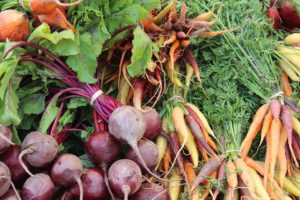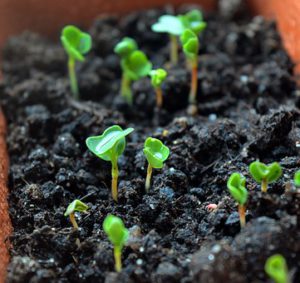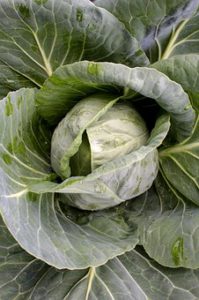Growing and Eating Healthy from Your Garden

Organic gardening is making waves in so many home gardens as well as food that’s grown on a wider (farms) scale. The need to eat healthily is a growing concern as more people are becoming health-conscious and are aware of how food crops are grown.
So many backyards are now being started by organic farming and then there are some gardens that are being turned into an organic garden by ripping out those beautiful flower beds to make space for a garden such as this and as painful as this may be to some homeowners taking out a flower bed completely or at least a portion is a small price to pay to grow your very own food crops in a healthy way.
The advantage of growing and organic garden is getting that much-needed exercise along with growing your own vegetables organically which is grown healthy and also will save on your grocery bill along with family bonding working together on the great outdoors.
With these many benefits, I can’t see why anyone would not want to get involved with this kind of activity that can be so rewarding.
Where do we get started?
I am so glad that you asked that question, it all begins with a plan, from there you are set to go ahead and begin your organic garden.
1. The location
To have success you must choose the right location, this location should at least get 5-6 hours of sunlight. All plant life needs light no matter their preference. Without sufficient light for your organic vegetable, you won’t have much success.

2. Soil does matter
The soil really does matter because garden soil is at the root or heart of gardening successfully. When it comes to garden soil we should take care to ensure that the soil we are using is of good quality. A soil that can hold the right amount of water but allow excess to drain that also provides proper air circulation is the ideal soil.
If you’re not sure about your soil quality it’s best to have a soil test done which will tell you about your soil such as soil ph, the number of nutrients that is present along with the soil structure. To have this kind of test done take several samples from different parts of your yard place in a plastic bag to take to a lab for testing.
A great idea is to also invest in a compost pile compost piles are so popular and will provide your organic garden with the nutrients it needs to sustain garden plants.
3. Seeds vs Seedlings
When it comes to deciding on which direction to go this can be confusing for many people. With seedlings, you will have a head start on your garden, seeds may take a lot longer but the end results are the same, and that’s a garden that’s thriving with healthy plants.
However ensure when purchasing seeds or seedlings the establishment is reputable, what you don’t want is to purchase a stock that’s sickly, disease, or insect-infested. Whichever method you decide to use find out about the care of plants such as planting depth along with water requirements.

4. Proper spacing
This is so important because if veggies are planted to close will encourage poor air circulation that will lead to disease.
5. Watering methods
Overwater your veggie garden and you are headed for trouble but if you give insufficient water can lead to issues also so ensure you are giving the right amount of water.
6. Plant nutrients
Because you are growing and organic garden the use of synthetics or man-made fertilizers is a NO-NO. Natural organics such as chicken, horse, cow manure, etc… is what should be used. But as was mentioned earlier a compost pile will provide your organic grown vegetables with all the needed nutrients.
7. Garden insect pests
Only organic sprays or homemade pesticides should be used to safeguard veggies from becoming contaminated. For more on homemade remedies refer to the category section.
The final word on how to grow an organic garden
Growing and organic vegetable garden have so many benefits and as you can see from what we have discussed these garden are easy to construct and maintain so if you’re desire is to eat healthy while saving those hard-earned dollars then and organic garden is the right fit for you. Go for it, by following these steps, you will be so happy that you did as you reap the reward of your labor.
About the author
Norman loves being in the garden, both at home and for his job....
he is 'Natures Little helper' being outdoors, growing his vegetables and flowers from an early age.
Now having spent over 22 years in the profession he want to give some of his knowledge to others...
his vast array of hints and tips you will find scattered over this site will help you no end growing plants in your garden.

I Love keeping a garden in my home but I hardly have time to monitor it properly, I’d love to dedicate more time and energy to it as I want to start incorporating some of the things you’re Sharing here into it. It’ll be nice to grow organic vegetables and I’ll follow this guideline accordingly. Thanks
You can always grow a low maintenance garden with plants that don’t need much attention. Growing and organic garden is really amazing, give it a try, you will love the results. Have a good day.
Thank you for this article. this was a great reminder for me. I have been planning to start a small garden for sometime now. Part of the reasons for my procrastination was the fact that I was not confident , I will do a great job but the info you provided here will give me a good start .
You are welcome and you can do it, I am so happy to help. All the best to you and have a good day.
Seems like a good thing for me to try out. I didn’t know that there was anything like organic vegetables andninis all because I didn’t realybgrow up at a place with lots of gardens but I mum loves to plant indoor. I would definitely give what you shared a try and see how good my vegetables grow.
Or yes there is, all organic vegetables are is growing vegetables without the use of man-made fertilizers and pesticides.